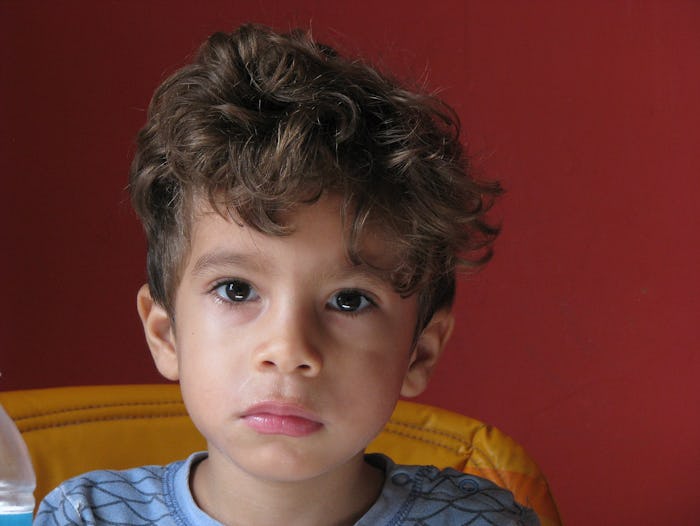Sorting things into boxes makes life a little bit easier to understand sometimes. But not all experiences fall into just one category or adhere to a simple label. For instance, plenty of people tend to think that mental health issues mostly occurs among adults or adolescents. The reality, however, is that children can also be affected. If you're concerned that your little one might be going through more than just "a rough patch," you may want to consider looking for early signs your toddler has depression. Even though kids around that age are typically the picture of exuberance and energy, mood disorders can still happen.
My friend's daughter was diagnosed with depression as a toddler and, at the time, I thought it was impossible for such a heavy condition to affect someone so small. But, like many others, I now know that mental health issues don't discriminate against age, race, gender or any other kind of classifier. In fact, acknowledging its prevalence is a huge step towards taking away the stigma that often surrounds mental disorders. The brain is a part of the body, just like anything else, and is equally deserving of treatment without bias. So if you think your toddler might be depressed, here are some signs to know about.
1They're Not Expressive
If you can't relate to other parents' complaints about their child talking too much, this could indicate something beyond shyness in your tot. As child psychologist Dr. Elizabeth Rody told Psych Central, "developmental delays in toddlers — not walking, talking, or expressing self," are signs of depression. Of course there isn't really a blanket rule for these things; some children truly are just late bloomers. But if you're concerned, you should speak with your child's doctor.
2They're Not Hungry
Has your child gone from eating regularly with plenty of gusto to shunning food and a loss of energy ? According to Baby Center, a decreased appetite, usually accompanied by lethargy, can indicate your young child is depressed. Food is one of the few things they have control over, and this could be their way of exhibiting their emotional state.
3Their Emotions Are Extreme
Whether it's uncontrollably sobbing or lashing out in anger, a sudden uptick in your child's behavior should warrant concern. As Everyday Health noted, "extreme behaviors show the child is no longer able to manage the overwhelming emotion they’re feeling." Depression is something even adults have a difficult time articulating. So it makes sense that your toddler would become frustrated with their feelings of despondence.
4They Insult Themselves
As a parent, it's not uncommon to hear your child say something surprising. But when they make disparaging remarks about themselves — no matter how rudimentary their language skills are — that can be a problem. According to a statement released by the National Association of School Psychologists, one sign of depression in toddlers is, "if they are old enough to talk, they may refer to themselves as stupid and ugly, friendless, unloved and unlovable, worthless, or even hopeless." Don't hesitate to seek outside help for your child if this is the case.
5They're Apathetic
The toddler years are typically when children approach everything in life with unlimited enthusiasm. That's why, as Rody told Pysch Central, a loss of interest in activities or objects they used to love is a sign of depression in toddlers. Though some children are prone to flitting from one thing to the next, it helps to ask your doctor if this change in behavior could be something more.
6Their Sleep Schedule Is Off
This can be another gray area since young children are notorious for bucking bedtime routines. However, excessive sleepiness or difficulty sleeping in a toddler can indicate depression, according to Baby Center. Basically, if their nighttime habits veer from one extreme to the other, you should check with their pediatrician to rule mood disorders out.
7They're Disruptive
If your toddler shows poor behavioral choices in a setting like daycare, school, or even at home, it could go beyond a bad attitude. According to the American Academy of Child & Adolescent Psychiatry (AACAP), "children and who cause trouble may be suffering from depression." The AACAP further explains that depression is often overlooked in toddlers because they don't seem sad. Acting out may just be their way of attempting to cope with being depressed. As always, talk to a medical professional about getting your child the help they need.
8It's Not A Phase
Every kid gets down in the dumps sometimes. But, as the Anxiety and Depression Association of America (ADAA) noted, if their unhappy mood lasts for longer than two weeks, depression could be the culprit. Though your toddler is still learning and growing, it's important not to blow off their feelings as "just a phase" because it could be their way of telling you something is wrong.
